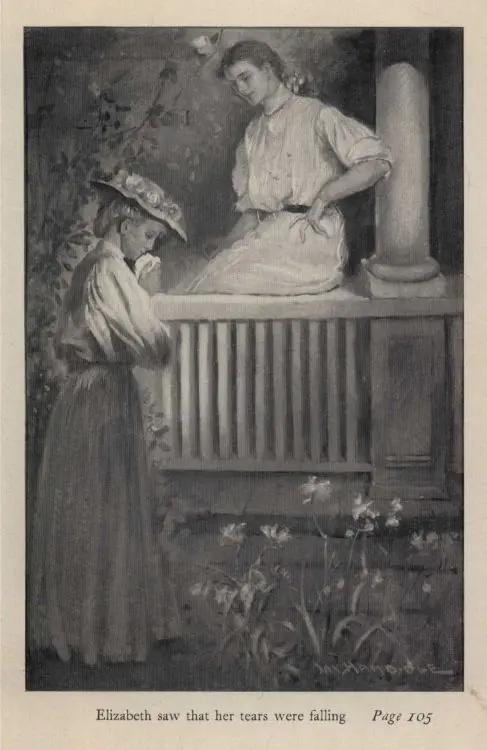Brand Whitlock - The Turn of the Balance
Здесь есть возможность читать онлайн «Brand Whitlock - The Turn of the Balance» — ознакомительный отрывок электронной книги совершенно бесплатно, а после прочтения отрывка купить полную версию. В некоторых случаях можно слушать аудио, скачать через торрент в формате fb2 и присутствует краткое содержание. Жанр: foreign_prose, foreign_antique, на английском языке. Описание произведения, (предисловие) а так же отзывы посетителей доступны на портале библиотеки ЛибКат.
- Название:The Turn of the Balance
- Автор:
- Жанр:
- Год:неизвестен
- ISBN:нет данных
- Рейтинг книги:3 / 5. Голосов: 1
-
Избранное:Добавить в избранное
- Отзывы:
-
Ваша оценка:
- 60
- 1
- 2
- 3
- 4
- 5
The Turn of the Balance: краткое содержание, описание и аннотация
Предлагаем к чтению аннотацию, описание, краткое содержание или предисловие (зависит от того, что написал сам автор книги «The Turn of the Balance»). Если вы не нашли необходимую информацию о книге — напишите в комментариях, мы постараемся отыскать её.
The Turn of the Balance — читать онлайн ознакомительный отрывок
Ниже представлен текст книги, разбитый по страницам. Система сохранения места последней прочитанной страницы, позволяет с удобством читать онлайн бесплатно книгу «The Turn of the Balance», без необходимости каждый раз заново искать на чём Вы остановились. Поставьте закладку, и сможете в любой момент перейти на страницу, на которой закончили чтение.
Интервал:
Закладка:
"I've just been to see him," she said.
"I wished to hear of him, Gusta," Elizabeth said, trying by her tone to destroy the quality of her first question. "I spoke to Mr. Marriott about him–I'm sure he'll get him off."
Gusta made no reply, and Elizabeth saw that her tears were falling.

Elizabeth saw that her tears were falling
"Come, Gusta," she said sympathetically, "you mustn't feel bad."
The girl suddenly looked at her, her eyes full of tears.
"Oh, Miss Elizabeth," she said, "if you could only know! To see him down there–in that place! Such a thing never happened to us before!"
"But I'm sure it'll all come out right in the end–I'm sure of that. There must have been some mistake. Tell me all about it."
And then Gusta told her the whole story.
"You don't know how it feels, Miss Elizabeth," she said when she had done, "to have your own brother–such a thing couldn't happen to you–here." Gusta glanced about her, taking in at a glance, as it were, the large house, and all its luxury and refinement and riches, as if these things were insurmountable barriers to such misfortune and disgrace.
Elizabeth saw the glance, and some way, suddenly, the light and warmth went out of the spring day for her. The two girls looked at each other a moment, then they looked away, and there was silence. Elizabeth's brows were contracted; in her eyes there was a look of pain.
When Gusta had gone Elizabeth went indoors, but her heart was heavy. She tried to throw off the feeling, but could not. She told herself that it was her imagination, always half morbid, but this did not satisfy her. She was silent at the luncheon-table until her mother said:
"Elizabeth, what in the world ails you?"
"Oh; nothing."
"I know something does," insisted Mrs. Ward.
Elizabeth, with her head inclined, was outlining with the prong of a fork the pattern on the salad bowl.
"Gusta has been here, telling me her troubles."
"Oh, that's it, is it?" said Mrs. Ward.
"You know her brother has been arrested."
"What for?"
"Stealing."
"Indeed! Well! I do wish she'd keep away! I'm sure I don't know what we've done that we should have such things brought into our house!"
"But it's too bad," said Elizabeth. "The young man–"
"Yes, the young man! If he'd go to work and earn an honest living, he wouldn't be arrested for stealing!"
"I was just thinking–" Elizabeth finished the pattern on the salad bowl and inclined her head on the other side, as if she had really designed the pattern and were studying the effect of her finished work,–"that if Dick–"
"Why, Elizabeth!" Mrs. Ward cried. "How can you say such a thing?"
Elizabeth smiled, and the smile irritated her mother.
"I'm sure it's entirely different!" Mrs. Ward went on. "Dick does not belong to that class at all!"
XIII
The truth was that Elizabeth had been worried for days about Dick. A few evenings before, Ward, who took counsel of his daughter rather than of his wife in such affairs, had told her of his concern about his son.
"I don't know what to do with the boy," he had said. "He seems to have no interest in anything; he tired of school, and he tired of college; and now he is of age and–doing nothing."
She remembered how he had sat there, puffing at his cigar as if that could assist him to some conclusion.
"I tried him in the office for a while, you know, but he did not seem to take it seriously–of course, it wasn't really serious; the work went on as well without him as with him. I guess he knew that."
Elizabeth sat and thought, but the problem which her father had put to her immediately overpowered her; there seemed to be no solution at all–she could not even arrange its terms in her mind, and she was silent, yet her silence was charged with sympathy.
"I've talked to him, but that does no good. I've pleaded with him, but that does no good. I tried giving him unlimited money, then I put him on an allowance, then I cut him off altogether–it was just the same."
Ward smoked a moment in silence.
"I've thought of every known profession. He says he doesn't want to be a lawyer or a doctor; he has no taste for mechanics, and he seems to have no interest in business. I've thought of sending him abroad, or out West, but he doesn't want to do that."
And again the silence and the smoking and the pain.
"He's out to-night–where, I don't know. I don't want to know–I'm afraid to know!"
There was something wild, appealing and pathetic in this cry wrung from a father's heart. Elizabeth had looked up quickly, her own heart aching with pity. She recalled how he had said:
"Your mother–she doesn't understand; I don't know that I want her to; she idolizes the boy; she thinks he can't do wrong."
And then Elizabeth had slipped her arm about his neck, and, leaning over, had placed her cheek against his; her tears had come, and she had felt that his tears had come; he had patted her hand. They had sat thus for a long while.
"Poor boy!" Ward had said again. "He's only making trouble for himself. I'd like to help him, but somehow, Bess, I can't get next to him; when I try to talk to him, when I try to be confidential and all that–something comes between us, and I can't say it right. I can't talk to him as I could to any other man. I don't know why it is; I sometimes think that it's all my fault, that I haven't reared him right, that I haven't done my duty by him, and yet, God knows, I've tried!"
"Oh, papa," she had replied protestingly, "you mustn't blame yourself–you've done everything."
"He's really a good boy," Ward had gone on irrelevantly, ignoring himself in his large, unselfish thought for his son. "He's kind and generous, and he means well enough–and–and–I think he likes me."
This had touched her to the quick, and she had wept softly, stroking her father's cheek.
"Can't you–couldn't you–" he began. "Do you think you could talk to him, Bess?"
"I'll try," she said, and just then her brother had come into the room, rosy and happy and unsuspecting, and their confidences were at an end.
Ward did not realize, of course, that in asking Elizabeth to speak to Dick he was laying a heavy burden on her. She had promised her father in a kind of pity for him, a pity which sprang from her great love; but as she thought it over, wondering what she was to say, the ordeal grew greater and greater–greater than any she had ever had to encounter. For several days she was spared the necessity of redeeming her promise, for Dick was so little at home, and fortunately, as Elizabeth felt, when he was there the circumstances were not propitious. Then she kept putting it off, and putting it off; and the days went by. Her father had not recurred to the subject; having once opened his heart, he seemed suddenly to have closed it, even against her. His attitude was such that she felt she could not talk the matter over with him; if she could she might have asked him to give her back her promise. She could not talk it over with her mother, and she longed to talk it over with some one. One evening she had an impulse to tell Marriott about it. She knew that he could sympathize with her, and, what was more, she knew that he could sympathize with Dick, whereas she could not sympathize with Dick at all. Though she laughed, and sang, and read, and talked, and drove, and lived her customary life, the subject was always in her thoughts. Finally she discovered that she was adopting little subterfuges in order to evade it, and she became disgusted with herself. She had morbid fears that her character would give way under the strain. At night she lay awake waiting, as she knew her father must be waiting, for the ratchet of Dick's key in the night-latch.
Читать дальшеИнтервал:
Закладка:
Похожие книги на «The Turn of the Balance»
Представляем Вашему вниманию похожие книги на «The Turn of the Balance» списком для выбора. Мы отобрали схожую по названию и смыслу литературу в надежде предоставить читателям больше вариантов отыскать новые, интересные, ещё непрочитанные произведения.
Обсуждение, отзывы о книге «The Turn of the Balance» и просто собственные мнения читателей. Оставьте ваши комментарии, напишите, что Вы думаете о произведении, его смысле или главных героях. Укажите что конкретно понравилось, а что нет, и почему Вы так считаете.












